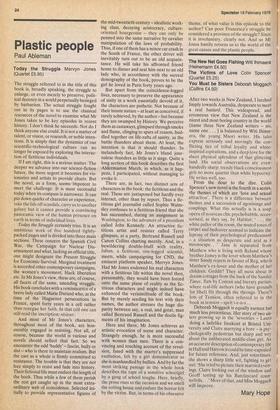The New Net Goes Fishing Witi ihimaera (Heinemann £4.50) The
Victims of , Love Colin Spencer (Quartet £5.25) You Must be Sisters Deborah Moggach (Collins £4.50) After two weeks in New Zealand, I lurched limply towards Australia, desperate to meet a real bastard. This widespread, and erroneous view that New Zealand is the nicest and most boring country in the world (name three New Zealand writers — no, name one . . . ) is balanced by Witi Ihimaera, the young Maori writer. His tales express seriously and movingly the conflicting ties of tribal loyalty and whiteinspired aspirations, and a deep love for the sheer physical splendour of that glittering land. His social observations are evenhandedly sharp: trendy black consciousness gets no more quarter than white hypocrisy. He writes well, too. From the dour to the dire. Colin Spencer's new novel is the fourth in a series, the themes of which are 'love and sexual attraction'. There is a difference between themes and a succession of agonisings and couplings. What this actually is is a soap opera of nouveau chic psychobabble, accessorised, as they say, by Habitat: ` . . . the white pallor of the room, the muted tones of carpet and bedcover seemed to indicate the leprosy of their psychological predicament — a situation as desperate and arid as a moonscape. . .' Jane is separated from Matthew who is living with Roland whose brother Jamey is the lover whom Matthew's sister Sandy rejects in favour of Reg, who is Matthew's ex-lover and the mother of her children. Geddit? They all mess about in dream cottages from the back of the Sunday Times, flats by Conran and literary parties, where real-life authors (who have grounds for libel) flit through the throngs. There's lots of Tension, often referred to in the book as tension — spelt t-e-n-s . . .
Deborah Moggach is equally earnest but much less pretentious. Her story of two sisters growing up in the 'seventies — Laura doing a ladylike freakout at Bristol University and Claire marrying a bore — is psychologically pedestrian but sharp and wry about the unliberated middle-class girl. As an accurate description of contemporary life in Hall and Harrow it could be time-capsuled for future reference. And, just sometimes, she shows a sharp little wit, fighting to get out: 'She tried to picture their married evenings. Claire looking out of the window and Geoff totting up his Barclaycard counterfoils. . .' More of that, and Miss Moggach will improve.
Mary Hope


































 Previous page
Previous page